
Guests
- Shezza Abboushi Dallalstaff attorney with the CLEAR project at CUNY School of Law and a member of Mohsen Mahdawi’s legal defense team.
Columbia University student and Palestinian activist Mohsen Mahdawi has been released on bail by a Vermont judge after more than two weeks in U.S. immigration custody. “I am saying it clear and loud to President Trump and his Cabinet: I am not afraid of you,” he told supporters as he left a Vermont courthouse. Despite being a legal permanent resident, Mahdawi was arrested by immigration enforcement last month at what he was told would be a citizenship interview, and accused by the State Department of posing a threat to national security over his pro-Palestine campus activism. We get an update from Shezza Abboushi Dallal, part of Mahdawi’s legal team, who says his release was facilitated by the prior blocking of his transfer to a jurisdiction more favorable to the Trump administration. Mahdawi will now be able to attend his graduation from Columbia University this month.
Transcript
NERMEEN SHAIKH: We begin today’s show in Vermont, where Columbia University student and Palestinian activist Mohsen Mahdawi was released after more than two weeks in U.S. immigration custody. Mahdawi is a green card holder from Palestine who was born and raised in a refugee camp in the occupied West Bank. He was arrested on April 14th when he appeared for what he was told would be a citizenship interview. Mahdawi had participated in the Palestinian solidarity protests at Columbia last year. He was also president of the Columbia University Buddhist Association.
He was freed on bail on Wednesday by U.S. District Judge Geoffrey Crawford, who criticized the Trump administration’s handling of the case. In his ruling, Crawford wrote that Mahdawi had made, quote, “substantial claims that his detention is the result of a retaliation for protected speech that he engaged in as a college student on the Columbia campus.” Crawford went on to write, quote, “The court also considers the extraordinary setting of this case and others like it. Legal residents — not charged with crimes or misconduct — are being arrested and threatened with deportation for stating their views on the political issues of the day. Our nation has seen times like this before, especially during the Red Scare and Palmer Raids of 1919-1920 that led to the deportation of hundreds of people suspected of anarchist or communist views,” Crawford wrote.
AMY GOODMAN: After Mohsen Mahdawi left the federal courthouse in Burlington, Vermont, he addressed supporters.
MOHSEN MAHDAWI: And we send a clear message, as well, that if we have faith in our beliefs, unshakable beliefs, which is the belief that justice is inevitable, we will not fear anyone, because our fight is a fight for love, is a fight for democracy, is a fight for humanity. And I am saying it clear and loud to President Trump and his Cabinet: I am not afraid of you. …
Never give up on the idea that justice will prevail and that we have to come together to bring our voices and our hearts and raise them, not only for America, not only for this system of democracy that has checks and balances — and this court is part of it — but also for our humanity. We have to restore and reform the international order and abide by international law as the first step towards justice. We must stand up for humanity, because the rest of the world, not only Palestine, is watching us, and what is going to happen in America is going to affect the rest of the world.
I will end up by saying to my people in Palestine: I feel your pain, I see you suffering, and I see the freedom, and it is very, very soon. Free, free Palestine.
AMY GOODMAN: Columbia University student and Palestinian activist Mohsen Mahdawi, speaking in Burlington, Vermont, Wednesday after he was freed after over two weeks in an immigration jail.
We’re joined now by a member of his legal team, Shezza Abboushi Dallal. She’s a staff attorney with the CLEAR project at CUNY School of Law.
Shezza, thank you so much for being with us. I know you’ve just returned from Vermont, where you were with Mohsen. Can you talk about the significance of what the judge ruled, and what are the conditions of Mohsen’s release?
SHEZZA ABBOUSHI DALLAL: Thank you for having me, Amy.
I can’t overstate the significance of this ruling and the fact that Mohsen walked free yesterday and wakes up today in his home in Vermont, not in an ICE detention facility being punished for speaking out for Palestinian lives and freedom and against the genocide in Gaza. The judge yesterday ruled — ordered him released on bail. And this is, you know, release on his own recognizance, so he will be able to return to his home in Vermont, continue his studies at Columbia University, complete his undergraduate degree and continue on to a master’s program in the fall, and continue his advocacy for Palestinian life and dignity and freedom. And that’s of paramount importance to him.
And it was of paramount importance to the judge, too. The judge acknowledged that, you know, this is on a backdrop of a chapter of U.S. history that is repressive and evocative of moments before, where the government attempts to wield the immigration system, detention, to punish people for their First Amendment protected speech, for their political advocacy. And the judge situated his decision on that backdrop, in that context.
NERMEEN SHAIKH: Shezza, as you said, he can come back to New York. He can return to his studies at Columbia, begin his master’s degree next year. Are there any other restrictions on his movement? In other words, he can come from Vermont to New York, but can he go anywhere else? And what is the remaining immigration case against him?
SHEZZA ABBOUSHI DALLAL: So, he’s released pending the culmination of his federal litigation, so his habeas litigation in federal court in Vermont. And so, the conditions reflect that. You know, his court case is in Vermont, so he needs to stay around close to the court, close to the court’s jurisdiction, in order to see that process through. And that’s what that’s going to look like.
NERMEEN SHAIKH: And the Trump administration initially did want to move him, as well, Mohsen, to the same Louisiana immigration jail that Mahmoud Khalil — two other students — Rümeysa Öztürk are held in? How come he was not sent to Louisiana, but to Vermont instead?
SHEZZA ABBOUSHI DALLAL: That’s exactly right. The administration was playing the same card and attempting to do the same exact thing that they did with Mahmoud Khalil, Rümeysa Öztürk, Badar Khan Suri. They took him, abducted him at his naturalization interview. In the final moments after he had signed, saying that he would take an oath to the Constitution, masked men entered the room and abducted him. And then they attempted to swiftly take him to the airport in order to commence a route towards Louisiana.
And the only thing that stopped him is Mohsen’s legal team’s intervention. They filed the habeas petition before they had the opportunity to put him on a flight. And in fact, they took him all the way to the airport and missed a flight out from Burlington, Vermont, at the very last moment. So, we had the benefit of having learned what the Trump administration’s playbook is on all of these cases, to whisk people, abduct them, take them away from their communities into fora that are favorable for the government, and then present a series of delay tactics in their federal court proceedings on the basis of the fact that they are now in another state, like Louisiana.
And so, ultimately, Mohsen was able to remain in his home state of Vermont surrounded by his community. And anybody who’s seen footage or had the fortune of being at court or in front of court yesterday in the District of Vermont was able to see the power of that community and how, you know, people showed up in outrage at what is happening to Mohsen and all the other people, like Mahmoud and Rümeysa and Badar Khan Suri, who do not have the benefit of being in their home state and are still waiting to have their motions for release heard by the respective federal courts that they are in.
AMY GOODMAN: And so, in the case of Rümeysa, the Fulbright scholar from Tufts, the international graduate student, a federal judge has ruled her case must be heard in Vermont, but she is still in Louisiana, being held there because she was moved there. Shezza, so, Mohsen gets to come to New York for graduation at Columbia University?
SHEZZA ABBOUSHI DALLAL: Yes, he does.
AMY GOODMAN: I want to thank you very much for being with us, Shezza Abboushi Dallal, staff attorney with the CLEAR project at CUNY School of Law and a member of Mohsen Mahdawi’s legal defense team. She’s just back from Vermont, here in New York, as she was with him yesterday as he was released.
When we come back, today is May Day, massive protests planned across the country. We’ll talk to a New York father whose 19-year-old son was detained in the Bronx, then flown with 230 other Venezuelans to a notorious mega-prison in El Salvador, where he’s being held incommunicado. Stay with us.
[break]
AMY GOODMAN: Mohsen Mahdawi singing “Spirit of Life” with his supporters after he was released Wednesday in Burlington, Vermont, from an ICE jail.

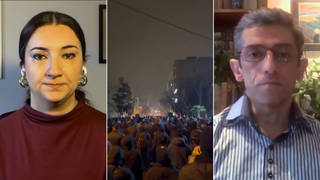
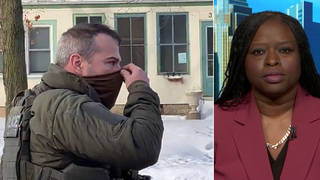
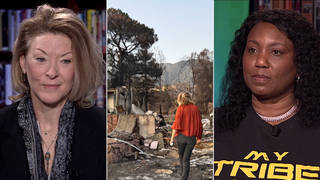
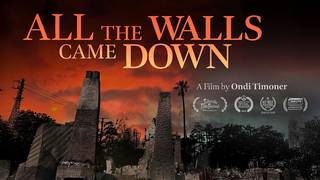
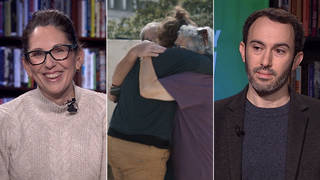
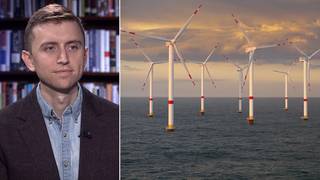
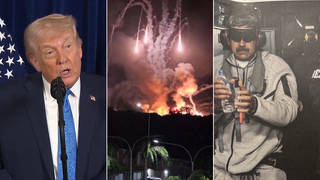

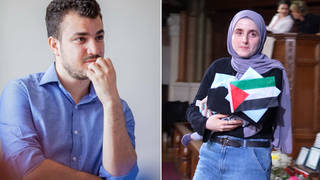

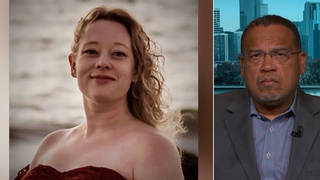
Media Options